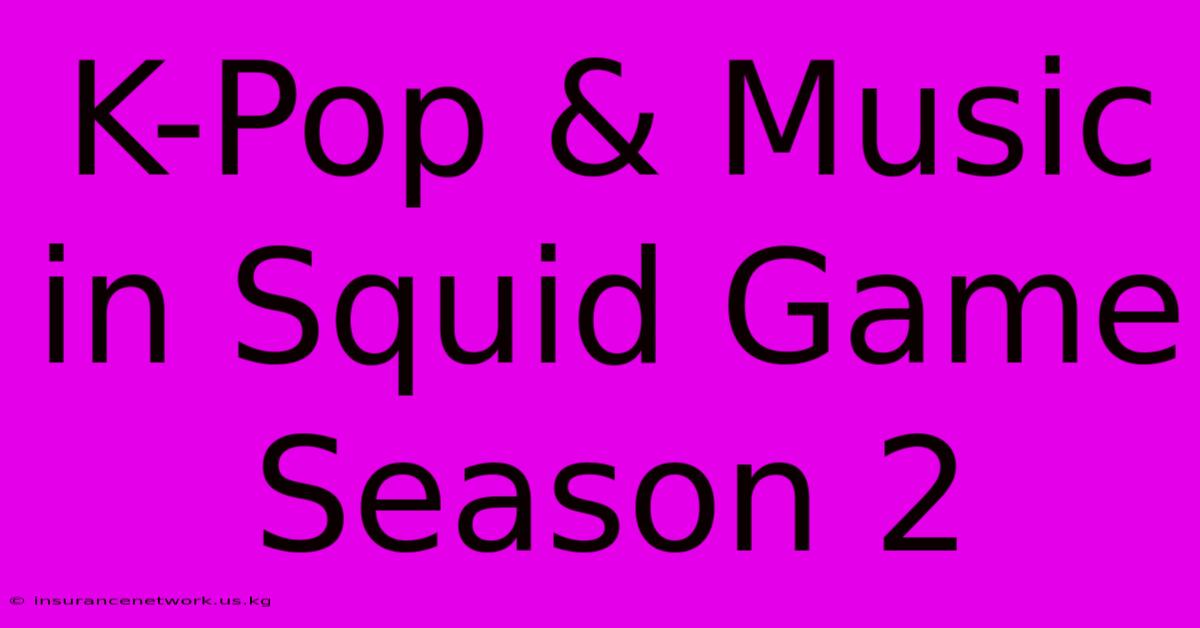K-Pop & Music In Squid Game Season 2

Discover more detailed and exciting information on our website. Click the link below to start your adventure: Visit Best Website insurancenetwork.us.kg. Don't miss out!
Table of Contents
K-Pop & Music in Squid Game Season 2: What to Expect
The global phenomenon that is Squid Game captivated audiences worldwide with its brutal yet compelling narrative. Now, with the highly anticipated Season 2 on the horizon, speculation is rife about what the new season will bring. One intriguing aspect fans are buzzing about is the potential role of K-Pop and Korean music more broadly. Season 1 featured subtle yet effective uses of music, and Season 2 could amplify this element significantly.
The Musical Landscape of Squid Game Season 1
While not overtly featuring K-Pop idols, Squid Game Season 1 strategically employed music to heighten tension, create atmosphere, and underscore emotional moments. The use of traditional Korean children's songs, like "Mugunghwa kkochi pieotseumnida" (무궁화 꽃이 피었습니다), juxtaposed against the deadly games, created a jarring and unforgettable effect. This stark contrast between innocent melody and brutal violence established a distinctive and unsettling tone.
The Power of Contrast: Traditional vs. Modern
The show's soundtrack masterfully utilized this contrast between traditional Korean sounds and more contemporary, tense scores. This blending of musical styles mirrored the show's narrative, a potent blend of classic children's games and stark modern violence. The effectiveness of this approach suggests that Season 2 could further explore this stylistic juxtaposition, perhaps even incorporating K-Pop elements more directly.
K-Pop's Potential Role in Squid Game Season 2
The inclusion of K-Pop in Squid Game Season 2 isn't just a possibility; it's a compelling narrative opportunity. Several avenues could be explored:
1. Diegetic Music: Sounds of the Games
Imagine the unsettling thrill of players competing to the beat of a popular K-Pop track, the upbeat rhythm ironically contrasting with the life-or-death stakes. This could create a unique level of tension and psychological manipulation, further enhancing the show's unsettling atmosphere. The use of a song's lyrics could even subtly foreshadow events or the inner turmoil of a character.
2. Non-Diegetic Score: Enhancing Emotional Impact
Season 2 could incorporate K-Pop-inspired musical themes into the score, subtly blending traditional Korean sounds with modern K-Pop influences to create a unique and emotionally resonant soundtrack. This approach would maintain the show's distinctive style while introducing a new layer of sonic complexity.
3. Plot Integration: K-Pop as a Narrative Device
Perhaps a character's backstory is linked to the K-Pop industry, or a game involves a K-Pop-themed challenge. This integration would not only offer a fresh perspective but also provide a compelling narrative thread, enriching the overall storyline. Think of the potential – a game based on intricate K-Pop choreography or a character whose past revolves around the demanding world of the idol industry.
Beyond K-Pop: The Broader Scope of Korean Music
While K-Pop is undeniably a dominant force in Korean music, Season 2 could also incorporate other genres, like Trot or Indie Korean music. The diversity of Korean music provides a rich tapestry of sounds that could further enhance the show's narrative complexity and cultural depth.
The Global Impact: Amplifying International Appeal
The inclusion of K-Pop in Squid Game Season 2 would be a smart strategic move, further enhancing the show's global appeal. The already massive international fanbase of K-Pop could be drawn into the Squid Game universe, expanding its reach even further.
Conclusion: A Thrilling Prospect
The anticipation surrounding Squid Game Season 2 is palpable. The potential inclusion of K-Pop and the wider spectrum of Korean music opens up exciting possibilities for the show's narrative and sonic landscape. Whether it's subtly woven into the background score or prominently featured in the games themselves, the strategic use of music will undoubtedly play a crucial role in shaping the emotional impact and overall success of the new season. The possibilities are endless, making the wait for Season 2 even more electrifying.

Thank you for visiting our website wich cover about K-Pop & Music In Squid Game Season 2. We hope the information provided has been useful to you. Feel free to contact us if you have any questions or need further assistance. See you next time and dont miss to bookmark.
Featured Posts
-
Azerbaijan Airlines Crash 38 Killed In Kazakhstan
Dec 26, 2024
-
Nfl Refs Call On Xavier Worthy Questioned
Dec 26, 2024
-
Kelce Tops Gonzalezs Career Tds
Dec 26, 2024
-
Travis Kelces Record Breaking Season
Dec 26, 2024
-
Ravens Vs Texans Zay Flowers Injury Update
Dec 26, 2024
